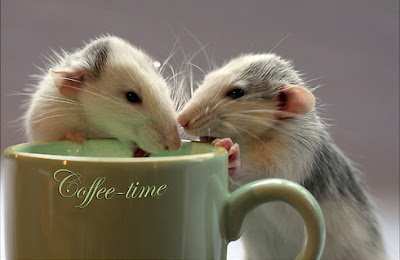Neuroscience
It seems to work for rats...

Wonderful World of Rats
Reference
Seo HS, Hirano M, Shibato J, Rakwal R, Hwang IK, Masuo Y. (2008). Effects of Coffee Bean Aroma on the Rat Brain Stressed by Sleep Deprivation: A Selected Transcript- and 2D Gel-Based Proteome Analysis. J Agric Food Chem. Jun 3. [Epub ahead of print]
The aim of this study was 2-fold: (i) to demonstrate influences of roasted coffee bean aroma on rat brain functions by using the transcriptomics and proteomics approaches and (ii) to evaluate the impact of roasted coffee bean aroma on stress induced by sleep deprivation. The aroma of the roasted coffee beans was administered to four groups of adult male Wistar rats: 1, control group; 2, 24 h sleep deprivation-induced stress group (the stress group); 3, coffee aroma-exposed group without stress (the coffee group); and 4, the stress with coffee aroma group (the stress with coffee group). Reverse transcriptase-polymerase chain reaction (RT-PCR) analysis of some known genes responsive to aroma or stress was performed using total RNA from these four groups. A total of 17 selected genes of the coffee were differently expressed over the control. Additionally, the expression levels of 13 genes were different between the stress group and the stress with coffee group: Up-regulation was found for 11 genes, and down-regulation was seen for two genes in the stress with coffee group. We also looked to changes in protein profiles in these four samples using two-dimensional (2D) gel electrophoresis; 25 differently expressed gel spots were detected on 2D gels stained by silver nitrate. Out of these, a total of nine proteins were identified by mass spectrometry. Identified proteins belonged to five functional categories: antioxidant; protein fate; cell rescue, defense, and virulence; cellular communication/signal transduction mechanism; and energy metabolism. Among the differentially expressed genes and proteins between the stress and the stress with coffee group, NGFR, trkC, GIR, thiol-specific antioxidant protein, and heat shock 70 kDa protein 5 are known to have antioxidant or antistress functions. In conclusion, the roasted coffee bean aroma changes the mRNA and protein expression levels of the rat brain, providing for the first time clues to the potential antioxidant or stress relaxation activities of the coffee bean aroma.

- Coffee Helps Women Cope With Stressful Meetings But Has The Opposite Effect On Men
For men working together, stress plus coffee could be toxicIf a meeting becomes stressful, does it help, or make things worse, if team members drink lots of coffee? A study by Lindsay St. Claire and colleagues that set out to answer this question has...
- Physical Warmth Affects Our Judgments Of Others And Our Behaviour Towards Them
We often draw on physical metaphors when we think and talk about our feelings. We might describe someone as having a warm heart. Or we'll speak of a wrong-doer as washing their hands of a crime. Past research has shown that this mental link with the...
- Chocolate Mooncakes (gluten-free). Or, Recipes On The Blog!
I've been cooking & posting photos / recipes to my Facebook page for a while now. That turns out to be satisfying because my friends post comments ... but ultimately is unsatisfying because I can't easily refer people...
- Celebrating Olfaction
Sunday, April 30 is National Sense of Smell Day, and the Sense of Smell Institute is ready. Their web site includes bibliographies on topics like odor perception and the brain and human behavior, mood, and emotion (aka aroma-chology). Plus fun activities...
- Free Donuts And Ice Coffee 5/12 10:00 Am-12:00 Pm In Bsos Alumni Room!
FREE Donuts and Ice CoffeeTuesday, May 1210:00 am-12:00 pmBSOS Alumni Room2nd Floor Tydings Hall Need a quick break from studying or some free food to recharge for finals? Stop by for some Dunkin’ Donuts and Ice Coffee tomorrow morning, May 12 from...
Neuroscience
Wake Up and Smell the Coffee?
It seems to work for rats...

Wonderful World of Rats
Is a sniff as good as a cup of coffee?Think of the new marketing possibilities!
11 June 2008
From New Scientist Print Edition.
DRINKING a cup of coffee can wake you up, but perhaps just a whiff of Java is enough to reverse the effects of sleep deprivation on the brain. A team led by Yoshinori Masuo at the National Institute of Advanced Industrial Science and Technology in Tsukuba, Japan, deprived rats of sleep for a day. When they examined their brains they found reduced levels of mRNA - messenger molecules that indicate when a gene is being expressed - for 11 genes important to brain function. When the rats were exposed to the aroma of coffee, the mRNA for nine of the genes was restored to near normal levels, and pushed to above normal levels for two - GIR, involved in neuro-endocrine control, and NFGR, thought to control oxidative stress (Seo et al., 2008). We don't know if the same genes are suppressed in sleep-deprived humans, nor whether we would feel tired if they were [NOTE: but that won't stop us from wild speculation], but many of these genes do have human equivalents. So the team says gene suppression may help explain why people feel bad when they haven't had enough sleep - and that gene reactivation could explain why people love the smell of coffee. [NOTE: did the team inhale a little too much coffee bean aroma?] Next the team hopes to identify the molecules in coffee aroma that affect gene expression. They suggest pumping them into factories to help revive tired workers who can't sip coffee while operating machinery.
Reference
Seo HS, Hirano M, Shibato J, Rakwal R, Hwang IK, Masuo Y. (2008). Effects of Coffee Bean Aroma on the Rat Brain Stressed by Sleep Deprivation: A Selected Transcript- and 2D Gel-Based Proteome Analysis. J Agric Food Chem. Jun 3. [Epub ahead of print]
The aim of this study was 2-fold: (i) to demonstrate influences of roasted coffee bean aroma on rat brain functions by using the transcriptomics and proteomics approaches and (ii) to evaluate the impact of roasted coffee bean aroma on stress induced by sleep deprivation. The aroma of the roasted coffee beans was administered to four groups of adult male Wistar rats: 1, control group; 2, 24 h sleep deprivation-induced stress group (the stress group); 3, coffee aroma-exposed group without stress (the coffee group); and 4, the stress with coffee aroma group (the stress with coffee group). Reverse transcriptase-polymerase chain reaction (RT-PCR) analysis of some known genes responsive to aroma or stress was performed using total RNA from these four groups. A total of 17 selected genes of the coffee were differently expressed over the control. Additionally, the expression levels of 13 genes were different between the stress group and the stress with coffee group: Up-regulation was found for 11 genes, and down-regulation was seen for two genes in the stress with coffee group. We also looked to changes in protein profiles in these four samples using two-dimensional (2D) gel electrophoresis; 25 differently expressed gel spots were detected on 2D gels stained by silver nitrate. Out of these, a total of nine proteins were identified by mass spectrometry. Identified proteins belonged to five functional categories: antioxidant; protein fate; cell rescue, defense, and virulence; cellular communication/signal transduction mechanism; and energy metabolism. Among the differentially expressed genes and proteins between the stress and the stress with coffee group, NGFR, trkC, GIR, thiol-specific antioxidant protein, and heat shock 70 kDa protein 5 are known to have antioxidant or antistress functions. In conclusion, the roasted coffee bean aroma changes the mRNA and protein expression levels of the rat brain, providing for the first time clues to the potential antioxidant or stress relaxation activities of the coffee bean aroma.

Simulating the Coffee Drinker’s Nose
Is Scratch ‘n Sniff Starbucks in our future?
No industry focuses as much on olfactory marketing as the coffee business...
Is Scratch ‘n Sniff Starbucks in our future?
No industry focuses as much on olfactory marketing as the coffee business...
- Coffee Helps Women Cope With Stressful Meetings But Has The Opposite Effect On Men
For men working together, stress plus coffee could be toxicIf a meeting becomes stressful, does it help, or make things worse, if team members drink lots of coffee? A study by Lindsay St. Claire and colleagues that set out to answer this question has...
- Physical Warmth Affects Our Judgments Of Others And Our Behaviour Towards Them
We often draw on physical metaphors when we think and talk about our feelings. We might describe someone as having a warm heart. Or we'll speak of a wrong-doer as washing their hands of a crime. Past research has shown that this mental link with the...
- Chocolate Mooncakes (gluten-free). Or, Recipes On The Blog!
I've been cooking & posting photos / recipes to my Facebook page for a while now. That turns out to be satisfying because my friends post comments ... but ultimately is unsatisfying because I can't easily refer people...
- Celebrating Olfaction
Sunday, April 30 is National Sense of Smell Day, and the Sense of Smell Institute is ready. Their web site includes bibliographies on topics like odor perception and the brain and human behavior, mood, and emotion (aka aroma-chology). Plus fun activities...
- Free Donuts And Ice Coffee 5/12 10:00 Am-12:00 Pm In Bsos Alumni Room!
FREE Donuts and Ice CoffeeTuesday, May 1210:00 am-12:00 pmBSOS Alumni Room2nd Floor Tydings Hall Need a quick break from studying or some free food to recharge for finals? Stop by for some Dunkin’ Donuts and Ice Coffee tomorrow morning, May 12 from...
